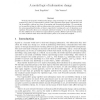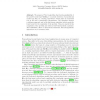118
Voted
KI
1992
Springer
15 years 4 months ago
1992
Springer
Abstract. The purpose of this note is to present and evaluate the options available to a researcher wishing to use logic for representation, reasoning and computation in his applic...
TARK
1998
Springer
15 years 4 months ago
1998
Springer
We study the dynamics of information change, using modal logic as a vehicle. Our semantic perspective is that of a supermodel in which a state represents some agent's informa...
115
Voted
CADE
1999
Springer
15 years 4 months ago
1999
Springer
We present a PSpace algorithm that decides satisfiability of the graded modal logic Gr(KR)—a natural extension of propositional modal logic KR by counting expressions—which pl...
102
click to vote
AMAST
2000
Springer
15 years 4 months ago
2000
Springer
The primary objective of this paper is to present the deÿnition of a new dynamic, linear and modal logic for security protocols. The logic is compact, expressive and formal. It a...
TLCA
2001
Springer
15 years 4 months ago
2001
Springer
We extend the modal logic of ambients described in [7] to the full ambient calculus, including name restriction. We introduce logical operators that can be used to make assertions ...
TACS
2001
Springer
15 years 4 months ago
2001
Springer
Abstract. We present two modal typing systems with the approximation modality, which has been proposed by the author to capture selfreferences involved in computer programs and the...
93
Voted
EPIA
2001
Springer
15 years 5 months ago
2001
Springer
Abstract. The situation calculus, originally conceived by John McCarthy, is one of the main representation languages in artificial intelligence. The original papers introducing th...
104
Voted
ATAL
2003
Springer
15 years 5 months ago
2003
Springer
The problem investigated in this paper is the distribution of goals addressed to a group of rational agents. Those agents are characterized by their ability (i.e. what they can do...
107
Voted
ICAIL
2003
ACM
15 years 5 months ago
2003
ACM
This paper proposes a logic-oriented framework for institutional agents specification and analysis. Within this framework institutional agents are seen as artificial agents that a...
88
Voted
KR
2004
Springer
15 years 5 months ago
2004
Springer
We extend graded modal logic (GML) to a logic that captures the concept of majority. We provide an axiomatization for majority logic, MJL, and sketch soundness and completeness pr...


